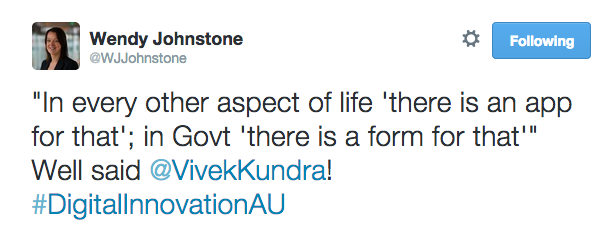
Get your FREE 30-day trial.
Start by selecting a product:
As Technology panel events go, it doesn’t get more star-studded than the launch of the Government’s new Digital Transformation Office (DTO). Not only was the event hosted by the Federal Minister for Communications, Malcolm Turnbull; but he was joined by Salesforce SVP, Vivek Kundra. Vivek always contributes so much value when he visits because prior to joining Salesforce, he was the first CIO of the US Federal Government, serving in the White House during Barack Obama’s first term. So it was a personal highlight when he held up the work done by Service NSW on the Salesforce1 Platform as a good example of digital transformation in Government.

Malcolm and Vivek were joined by three other pre-eminent professionals in the field of digital transformation, all experts in their own right and respective fields:
Kate McKenzie, COO, Telstra
David Curran, CIO, Westpac
Sahil Merchant, Senior Vice President and Head of McKinsey Digital (Australia)
As entertaining as the event was, it was also tremendously valuable as the collective brainstrust imparted so much wise advice for anyone embarking on a digital transformation program. For me the key takeaways were:
"Citizens are used to getting streamlined service from banks and airlines, they expect the same from Government." - Paul Fletcher MP
Expectations of service have been hugely coloured by the advances made across the private sector. Consumers have learnt a great deal about what digital possibilities exist from Airlines, Telcos and Banks; and are beginning to expect those from Government as well:

It was clear that Government was on notice to bring its services in line with those expectations and they should do so by learning from the private sector itself.
There was much agreement across the panel that before approaching digital transformation, Governments needed to adopt a certain mindset. They had a good deal of experience to share on how to do this. Among the key recommendations were to be agile and flexible, to have a global view and to be willing to bring in those from the frontline who are able to contribute real life experience.
“We found people working on the front line, and brought them into the White House. My biggest asset [as US CIO] was that I had never worked in Federal Government!" says Vivek Kundra.
"Digital platforms are so easy to adjust and modify - we are not locked into a single approach"
In order to build a platform for digital transformation, from a technology perspective, the panel agreed that certain characteristics were essential, and once again flexibility and agility were top of mind:
"You have to understand your IT architecture or you will keep making ‘work arounds’" advises Westpac CIO David Curran.
David added that "You have to be prepared to disrupt yourself, or you are going to be disrupted.".
Time is a pressing factor in the panel’s mind, and the urgent warning was that Digital Transformation was inevitable, the question was whether you would lead it or follow in its wake. “Don’t be a Kodak!” says David.
"You have to create an environment where people are *free* to innovate" says Telstra COO Kate McKenzie.
However, probably the area of debate that evoked the most passion was a discussion around the sort of culture required for Digital Transformation. Between them the panel urged courage in decision making, a willingness to authentically embrace failure and to at all costs avoid a culture of blame:
"You have to make the tough decisions and hold people accountable for [preventing] innovation" says Vivek.
"Moving from a blame culture is incredibly important...it makes people reluctant to take risks. If you have a culture of blame you will never develop a culture of innoatvion..Allowing failure must be authentic and supported otherwise it won't work.” - Turnbull Malcolm
Why does Telstra invest in incubators? Kate McKenzie says it helps to transform an org culture to be more innovative.
Finally, the panel were as one in the view that Government need to partner with the private sector, and have a willingness to include entrepreneurs in their programs that can assist in problem solving and creative innovation
"What attracts entrepreneurs [to working in Government innovation] is solving intractable problems” says Sahil Merchant.
The relevance of all of this to each and every citizen was made stark by the Minister’s concluding statement:
"Government is a third of GDP...every step we take making Government more efficient benefits everyone".
It was a clear reminder that the ROI on tax payers’ money invested in improving the interaction between citizen and Government should not only be measured in terms of dollar value.
It was a truly memorable event and as well as being webcast live, it was also archived below for those that missed it. It is well worth watching as there was so much more value than that I’ve noted here.
To receive more content about how technology is impacting the public sector, subscribe to the Salesforce blog today.